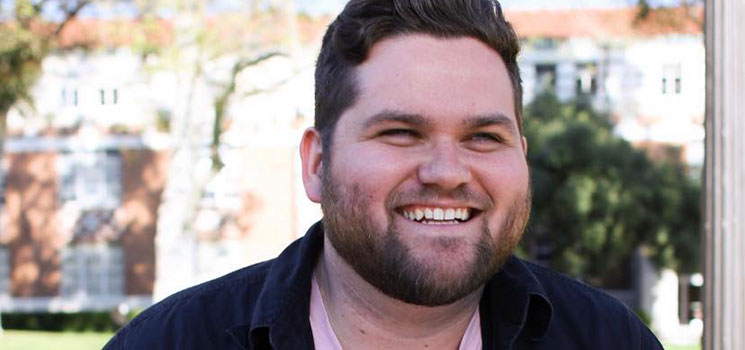News

Impossible Dream
First-year M.F.A. playwright Kyle McCloskey wins a Kennedy Center award for 'Where the Lovelight Gleams'
By Noela Hueso
It all seems a little serendipitous. First-year M.F.A. Department of Theater student Kyle McCloskey won a prestigious award in February named after Pulitzer Prize-winning playwright Paula Vogel...for writing a play in a class devoted to exploring the works of Vogel...in the same academic year that Vogel was named Distinguished Playwright-in-Residence at the UCLA School of Theater, Film and Television.
"This has been my favorite instance of Inception I've ever had the privilege of being part of," McCloskey says. "I'm just so thankful I got to study one of my favorite playwrights ever, and now to win the award with her namesake? It's bliss."
McCloskey, 24, is the recipient of The Kennedy Center American College Theater Festival's Paula Vogel Award in Playwriting, which is given to an outstanding student-written play that explores issues of gender, diversity and sexual orientation. On the surface, McCloskey's Where the Lovelight Gleams is about three lesbian inmates who volunteer to fight a California wildfire. Dig a little deeper, though, and the play is also a commentary on the criminal justice system, the effects of global warming and the controversial California inmate firefighter program known as the Conservation Camp Program.
"When you add all of them together, it's about capitalism and socialism and how we as a society are supposed to move on," McCloskey says, "and then it's the story of these three women as they navigate all that."
McCloskey wrote Where the Lovelight Gleams in the Fall 2018 Paula Vogel Class, taught by Professor Sylvan Oswald, as an "impossible play," a term coined by Vogel that suggests a story that "literally can't be staged because it's so difficult [in either subject matter or presentation]," McCloskey says, pushing designers, actors, directors and audience members "past the bounds of what they think is possible." Where the Lovelight Gleams fits the bill perfectly: In McCloskey’s script, the play's stage is meant to be on fire for almost the entire performance.
In writing about queer inmates, McCloskey implemented another idea taught in the class, Vogel's concept of "negative empathy." He describes it as "creating narratives that don't necessarily jive with a mainstream audience and finding ways to put characters on the stage that we don't love but that are necessary in forwarding our culture and the progress of what the theater can be."
Telling stories that make a visceral impact on audiences is a style that appeals to McCloskey. Originally from Philadelphia, he comes from a family that stressed the importance of social justice. His 19 years of Catholic school education, including his undergraduate work at Loyola University Chicago, where he double majored in creative writing fiction and theater, also made an indelible impression on him and informed his writing style. Lovelight is very much emblematic of his quest to right — or at least bring attention to — wrongs in our society.
"Any time I find something in the world that literally makes no sense, I'm going to write a play about it," he says. "I use the theater as a form of social commentary and…as a Trojan horse for social justice."
Oswald agrees. "Kyle is interested in using his work to spark difficult conversations," he says. "He works with humor, spectacle, and impossibility to open up stubborn political problems, often about intersectional oppressions, especially class and gender."
McCloskey's award comes with membership in the Dramatists Guild and the Playwrights' Center in Minneapolis, an all-paid invitation to attend The Kennedy Center American College Theater Festival in April, and a professional development residency in this summer. He would love for Will Davis, the former artistic director of Chicago's now-defunct American Theatre Company (and for whom McCloskey worked when he was getting his undergraduate degree), to direct the workshop of the play during the residency.
"[Davis] believes in this idea of the 'wild theatrical'…creating a new context for the way that we are going to design the theater space and design the way that we tell stories in that space," McCloskey says. "[If not Davis, then] I want to find someone [like him] who is working, so, if they have this play and fall in love with it the way I have, we can work to get the attention of a theater or someone who can take a further interest in it to help move it forward," he says.
But first, this Spring Quarter, UCLA TFT lecturer Sarah Lyons will direct McCloskey's one-act play The Association of Strong Spirited Humans Against Tyranny and Stuff — or A Idiot's Guide to Making a Militia! (sic), a farce about the rise of the American militia movement.
"I'm a big fan of Brecht; he obviously uses this Marxist-Socialist viewpoint in his plays," McCloskey says. "They're all about the community coming together to fight against the tyranny and the fascism; I wanted to find the inverse of that. My play is very much about the excess of white supremacy. There's music, there's a hoedown, it's all over the place."
What the future holds remains to be seen but McCloskey knows this much: "I want to be known as a playwright first and foremost and I want to be someone who is trying to change the theater not just through thought but through spectacle and character; trying to reclaim what the Greeks and Brecht were trying to do, what Paula Vogel and Emily Mann are trying to do, and thrust that into a 21st century way of creating plays and art on stage."

McCloskey isn’t the only Bruin to be acknowledged at this year’s Kennedy Festival: Fellow UCLA TFT graduate student Cary Simowitz has been recognized with "distinguished achievement" in the fest's Rosa Parks Playwriting Award category for his play Djarum Vanilla, and alumnus Sean Michael McCord (B.A. ’82) has been awarded the National Partners of the American Theatre Playwriting Award for his play Moving.
Posted: April 3, 2019





